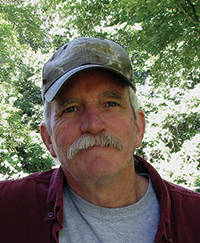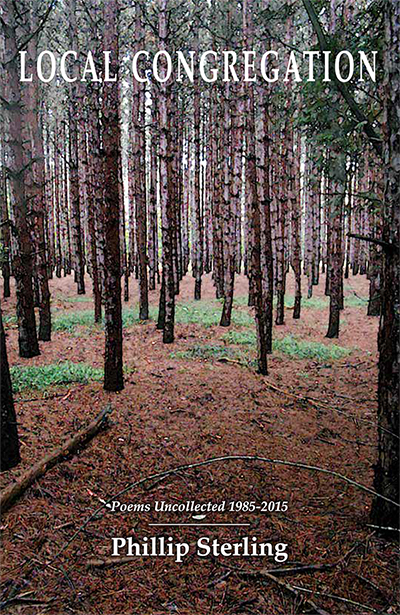Local Congregation
poems by
Phillip Sterling
ISBN: 978-1-59948-977-3, 88 pages, $15 (+ shipping)
Projected Release Date: October 10, 2023
The Advance Sale Discount price on this title has expired. For those who prefer to pay by check, the price is now $19/book (which includes shipping) and should be sent to: Main Street Rag, 4416 Shea Lane, Mint Hill, NC 28227.
PLEASE NOTE: Ordering in advance of the release date entitles the buyer to a discount. It does not mean the book will ship before the date posted above and the price only applies to copies ordered through the Main Street Rag Online Bookstore.
 Phillip Sterling’s previous books include the poetry collections And Then Snow and Mutual Shores, two collections of fiction, In Which Brief Stories Are Told and Amateur Husbandry, and five chapbook-length series of poems, most notably Short on Days, which was released from Main Street Rag in 2020. An associate poetry editor for Third Wednesday Magazine, he lists among his awards a National Endowment for the Arts Fellowship, two Fulbright Awards (Belgium and Poland) and selection as artist-in-residence for both Isle Royale National Park and Sleeping Bear Dunes National Lakeshore. He lives in Lowell, Michigan, where he and his wife, Jane Wheeler, tend a small woodlot and several gardens and care for an extravagance of animals and insects of questionable domesticity.
Phillip Sterling’s previous books include the poetry collections And Then Snow and Mutual Shores, two collections of fiction, In Which Brief Stories Are Told and Amateur Husbandry, and five chapbook-length series of poems, most notably Short on Days, which was released from Main Street Rag in 2020. An associate poetry editor for Third Wednesday Magazine, he lists among his awards a National Endowment for the Arts Fellowship, two Fulbright Awards (Belgium and Poland) and selection as artist-in-residence for both Isle Royale National Park and Sleeping Bear Dunes National Lakeshore. He lives in Lowell, Michigan, where he and his wife, Jane Wheeler, tend a small woodlot and several gardens and care for an extravagance of animals and insects of questionable domesticity.
Phillip Sterling’s poems have always blended a mastery of craft and precision with a deep, reflective awareness and insight, and Local Congregation is certainly no exception. Here, we find a poet at the height of his powers. With humor, humility, and grace earned through years of paying attention, he shines light on the small moments until they glow with insight and discovery. Sterling listens closely to the undercurrents, and we should all listen to him. ~Jim Daniels
Local Congregation is aptly named, both in what’s found at hand (“local”) and in “congregation” as this is a collection of poems (as congregants) from the writer’s literary church, if you will. Wonderfully built and compressed, snappy with wit and wisdom of the natural and spiritual worlds, these Frostian poems glimmer brightly. Careful readers will be singed and touched by Sterling’s good words, as in “Beginnings”: “the stories of one’s life strung out / from off-side the heart, fabricated // if need be, the worst forgotten. . . .” ~Patricia Clark, author of Self-Portrait with a Million Dollars and The Canopy, Professor Emerita of Writing, Grand Valley State University
The Holy Ghost
When the first maple husks bark like
latex house paint water’s gotten under
we curse the road crews, the salt trucks,
in our doubting blame the county.
After all it begins near the road. Soon
grass southeast of every winged-seed
browns to sourdough; our ears fill; we
hear through the night insects burrowing.
Soon we are called to hapless constellations,
white grubs scattered like snow peas
—haphazardly—among moist roots of rye.
So let’s say we plan to lace the dawn
with pesticide; and say, instead,
our witness lifts to dibs of sod upturned
above the bark beetles beneath those trees.
Say we sense the paw-scent of skunk; and
say it is a skunk, yes, some blessed creature
come to feed its white belief bright larva.
One Speaks of Longing
On the first morning of snow the old move
like the huge lumbering Chinook that start
the children screaming and waving and bring us
full panic to the edge of Mitchell Creek,
thinking: It must come to this,
certain that we’d need to wrestle coat sleeves—
and small body—from the bony, clutching roots
of a washed-out tree. But no, it’s only fish,
though of size and number we’d never seen there
before, and moving unnaturally slow:
green-finned Pacific winds purling the rock-
strewn shallows, hurling the culvert’s yawn
beneath the railroad tracks—desperate to spawn,
yet hardly able to heave their darkened bodies
upstream, slow as old fishermen, whose stories
are all the fishing they’ve done in years . . .
Or like the children’s grandfather, who tumbles
in his excitement, his church shoes hopeless
on the slick embankment, his astonishment
staggering. Again we think the worst:
Accidental, Before his time, This time for sure,
the dazzling, unfortunate final dowsing . . .
But wait! He rises on his own (as if knowing
we’d not reach him in time), regains his balance,
and will live to become a story—if not the history—
of wet clothes. So who’s to say who’s meant
to be saved? And who’s to say who’s meant
to laugh, as my father did, in the face of
death’s sport? Who’s to say we’re not all
meant to be lumbering, knowing that the snow
will pull us under eventually, that we will
abandon the rush and struggle, the stories
of our longing to return, of our turning onto
our sides and going back to sleep? (Who’s
to say we can’t go back, not even in longing . . . ?)
Look. Our skin pales like milt, blanches and
peels; our hair grays in comparison. We have
spawned, or had hoped to. And suited in
our clumsy waders we welcome the first snow.
Now Boarding
Let’s say you get on a plane.
You hadn’t planned to,
you really have no place to go,
but you were at the terminal
anyway, and on a whim
you take the next flight.
It doesn’t matter where.
Call it something in the weather,
a drizzle so low you’d found
it difficult to stand up,
and when the plane lands safely,
you catch the next flight
out of there—Chicago O’Hare,
Minneapolis, Pittsburgh—
the first available seat,
and launch into clouds
that refuse to stay in one place
long enough to be anyone’s
property, and when you land
in a rush of belonging
to the earth, you take the next
flight from there—Los Angeles,
Dallas, Phoenix—buckle in
and begin to look forward
to small difficult packages
of lightly salted pretzels,
an extravagant beer.
If you’re lucky, the flight
is interminable, full meals
will be served. If you’re lucky,
as you reach your cruising
altitude and speed
the sun will lock its glint
to the wing, and time will
become a sky spreading below
as though a pharmacist
in a momentary lack of faith
unseals countless quantities
of orange pill bottles and
strews their cotton stoppers
across a gray-green countertop.
There are good reasons to fly:
One is when you have to,
you’re expected, and travel
is the door you forgot to lock,
the pets you’ve boarded in
unsanitary kennels, desire
softening like overripe melon.
Another is when there’s no
reason not to, when no place on
earth can hold you, no one’s
found waiting at the gate
—bound to inquire about your
flight—when no one
who’s come to see you off
decides to leave with you
on the very next plane.


 Phillip Sterling’s previous books include the poetry collections And Then Snow and Mutual Shores, two collections of fiction, In Which Brief Stories Are Told and Amateur Husbandry, and five chapbook-length series of poems, most notably Short on Days, which was released from Main Street Rag in 2020. An associate poetry editor for Third Wednesday Magazine, he lists among his awards a National Endowment for the Arts Fellowship, two Fulbright Awards (Belgium and Poland) and selection as artist-in-residence for both Isle Royale National Park and Sleeping Bear Dunes National Lakeshore. He lives in Lowell, Michigan, where he and his wife, Jane Wheeler, tend a small woodlot and several gardens and care for an extravagance of animals and insects of questionable domesticity.
Phillip Sterling’s previous books include the poetry collections And Then Snow and Mutual Shores, two collections of fiction, In Which Brief Stories Are Told and Amateur Husbandry, and five chapbook-length series of poems, most notably Short on Days, which was released from Main Street Rag in 2020. An associate poetry editor for Third Wednesday Magazine, he lists among his awards a National Endowment for the Arts Fellowship, two Fulbright Awards (Belgium and Poland) and selection as artist-in-residence for both Isle Royale National Park and Sleeping Bear Dunes National Lakeshore. He lives in Lowell, Michigan, where he and his wife, Jane Wheeler, tend a small woodlot and several gardens and care for an extravagance of animals and insects of questionable domesticity.